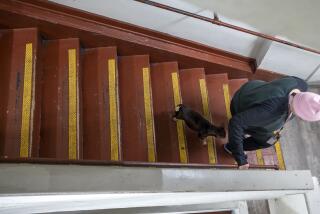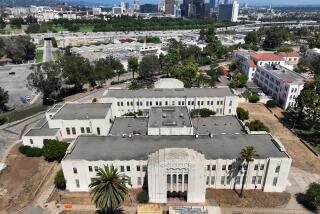Judge hands Hollywood developer a win, backing a plan for two residential towers
A judge has rejected a bid by the nonprofit AIDS Healthcare Foundation to block the construction of two residential towers next to the group’s Hollywood headquarters, handing a victory to the city of Los Angeles and the project’s developer.
In her 18-page ruling, Superior Court Judge Amy D. Hogue said city officials followed the state’s environmental law when they approved the two towers, which are expected to reach 30 stories and house 731 apartments. Hogue also said the city properly determined that the project’s “aesthetic impacts” were not significant.
Michael Weinstein, who heads the AIDS Healthcare Foundation, said his group will file an appeal of the ruling. “We feel that the [project’s environmental impact report] is wrong,” he said in an interview. “It doesn’t take into account the impacts on the area.”
The City Council voted to approve the project, called the Palladium Residences, in 2016. Weinstein and others aligned with the nonprofit called the project too large for its location and warned it would worsen traffic. Weinstein also said the project, which is planned next to the Hollywood Palladium, would fuel gentrification in the surrounding neighborhood.
A spokesman for the developer, Crescent Heights, responded at the time by accusing Weinstein of improperly using his nonprofit group as a “personal piggy bank” to fight a development that could block views from his 21st-floor office. Crescent Heights also called the allegations in the Palladium lawsuit “baseless.”
On Thursday, representatives for the developer had no comment on the ruling.
A spokesman for City Atty. Mike Feuer said in a statement that the ruling shows that city officials complied with the law when they approved the Palladium project.
AIDS Healthcare Foundation has become a major combatant in L.A.’s real estate battles. The group spent more than $5.5 million to support a March 2017 ballot measure that would have put new limits on the City Council’s ability to change planning and zoning rules for development projects.
Voters defeated the measure by a two-to-one margin. But AIDS Healthcare Foundation has also fought real estate projects on a case-by-case basis.
Two years ago, the foundation sued over plans for an office building in Hollywood roughly half a mile east of its headquarters. The group dropped that lawsuit after the developer, Hudson Pacific, agreed to shave the height of its building from 15 stories to 13.
Weinstein said his organization also paid the legal bills racked up by one of the groups that sued over a 27-story residential tower planned in Koreatown. A judge struck down the council’s approval of that project three months ago, saying the city should have prepared a full environmental impact report.
In addition, Weinstein said, AIDS Healthcare Foundation has paid for a portion of the legal costs incurred by foes of the Cumulus project at La Cienega and Jefferson boulevards. The council approved that development, including a 30-story tower, in 2016.
Weinstein said his group is also fighting the demolition of Parker Center, the LAPD’s old downtown headquarters, and opposes the redevelopment of the Baldwin Hills Crenshaw Plaza, a shopping mall in South Los Angeles.
In the Palladium lawsuit, lawyers for AIDS Healthcare Foundation made an array of claims. They argued that four members of the planning commission improperly met with the developer’s representatives in “ex parte” meetings — conversations that were not part of the panel’s scheduled public sessions.
Those private meetings showed that the commission, whose members are appointed by Mayor Eric Garcetti, had a “disqualifying bias” in favor of the project and that its decision was “fundamentally unfair,” the AIDS group said.
Hogue disagreed, saying the opponents failed to identify evidence of actual bias involving the commission.
The judge also disagreed with the claim by the AIDS nonprofit that it had been denied a fair hearing before the council’s Planning and Land Use Management Committee. And she rejected the group’s argument that the city had failed to properly analyze greenhouse gas emissions expected from the project.
Twitter: @DavidZahniser
UPDATES:
3:35 p.m. July 13: This article was updated with a statement from the city attorney’s office.
This article was originally published at 4:20 p.m. on July 12.
More to Read
Sign up for Essential California
The most important California stories and recommendations in your inbox every morning.
You may occasionally receive promotional content from the Los Angeles Times.











